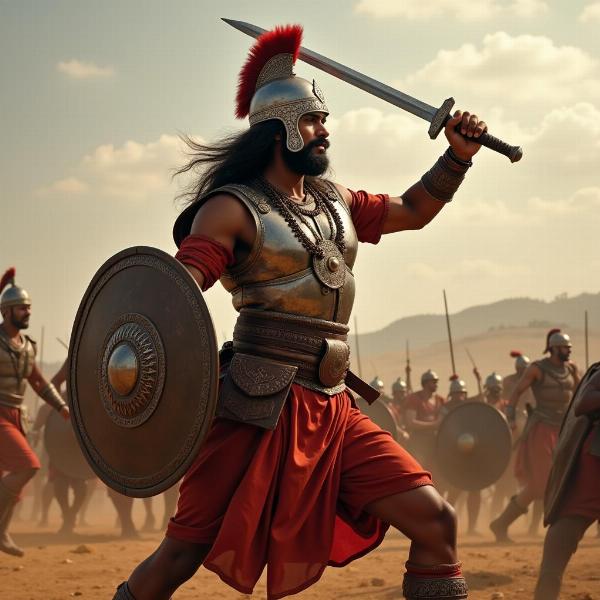Understanding the meaning of “kshetriya” in Hindi is crucial for grasping a significant aspect of Indian culture and history. This word, deeply rooted in the ancient social system, carries various connotations and implications. This guide delves into the multifaceted meaning of “kshetriya,” exploring its historical context, social significance, and modern relevance.
Exploring the Historical Context of “Kshetriya”
Historically, “kshetriya” (क्षत्रिय) refers to the second of the four varnas (social classes) in Hinduism, traditionally associated with warriors and rulers. The term originates from the Sanskrit word “kshatra,” meaning “rule” or “authority.” Kshetriyas held positions of power and were responsible for protecting the kingdom, upholding justice, and maintaining order. Their dharma (duty) included bravery, leadership, and skill in warfare. Ancient epics like the Mahabharata and Ramayana feature prominent kshetriya characters like Arjuna and Rama, showcasing their ideals and responsibilities.
 Kshetriya Warrior in Mahabharata
Kshetriya Warrior in Mahabharata
The Social Significance of the Kshetriya Varna
The kshetriya varna played a vital role in shaping ancient Indian society. Their authority and military prowess were essential for maintaining stability and defending against external threats. The concept of kshatriya dharma emphasized not just military strength but also righteous conduct, emphasizing qualities like honor, integrity, and selflessness. Kshatriyas were expected to be just rulers, protecting their subjects and ensuring their welfare. This social structure, while historically significant, has evolved over time, and the rigid varna system is less prevalent in modern India.
“Kshetriya” in Modern India: Relevance and Interpretations
In contemporary India, the concept of “kshetriya” is understood more as a historical and cultural reference than a strict social classification. While caste-based distinctions are legally outlawed, the term still carries cultural significance, particularly in discussions about lineage and historical identity. Some communities may still identify themselves as kshetriya based on their ancestral traditions and historical background. However, the focus has largely shifted from the traditional varna system towards a more egalitarian social structure.
“Kshetriya” Beyond the Varna: Other Meanings
It’s important to note that “kshetriya” can also have broader meanings beyond the varna system. It can sometimes be used more generally to refer to someone who displays bravery, leadership, or a protective nature, regardless of their social background. For example, a police officer or a soldier might be referred to as “kshetriya” in a figurative sense, acknowledging their courage and commitment to protecting others.
FAQs on “Kshetriya Meaning in Hindi”
- What is the literal meaning of kshetriya? The literal meaning of kshetriya is derived from “kshatra,” meaning “rule” or “authority.”
- What were the duties of a kshetriya? A kshetriya’s duties included protecting the kingdom, upholding justice, and maintaining order.
- Are there still kshetriyas in India today? While the varna system is less prevalent today, some communities still identify with their kshetriya lineage.
- What are some qualities associated with kshetriyas? Bravery, leadership, honor, and selflessness are some qualities associated with kshetriyas.
- Can “kshetriya” be used in a non-caste context? Yes, “kshetriya” can be used figuratively to describe someone brave and protective.
- What is the significance of “kshetriya” in Hindu scriptures? Hindu scriptures like the Mahabharata and Ramayana showcase kshetriya characters and their dharma.
- How has the understanding of “kshetriya” changed over time? The understanding of “kshetriya” has shifted from a rigid social classification to a more cultural and historical reference.
Conclusion: Understanding “Kshetriya” in its Entirety
Understanding the meaning of “kshetriya” in Hindi requires a nuanced perspective, acknowledging its historical context, social significance, and evolving interpretations. While the traditional varna system has diminished in modern India, the term “kshetriya” continues to hold cultural relevance. It serves as a reminder of ancient social structures, ideals of leadership and bravery, and the ongoing evolution of Indian society.
Meaning-Hindi.in offers expert translation and localization services for businesses, academics, and individuals seeking accurate and culturally sensitive communication. We specialize in Hindi translation and offer a range of services, including business and commercial document translation, legal and certified translation, technical and user manual translation, website and software localization, educational and academic translation, and express translation services. For professional, accurate, and culturally appropriate translations, contact us at [email protected] or call us at +91 11-4502-7584. Meaning-Hindi.in is your trusted partner for all your Hindi language needs.